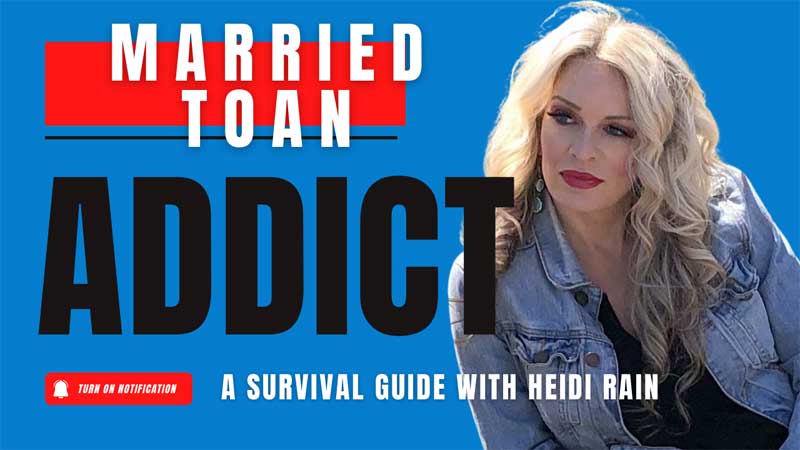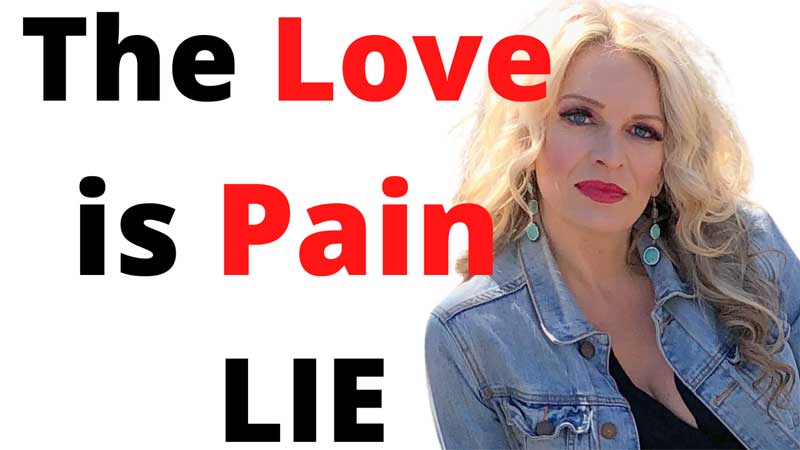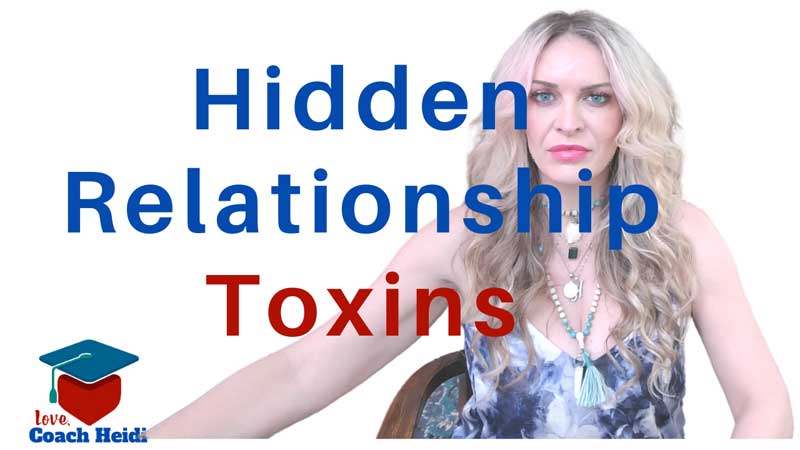*This is a video transcription, please pardon any miscellaneous annoying stuff that should have been edited out but we don’t have that kind of time around here.*
Addiction is a hurricane.
It’s exactly like a hurricane. I’m going to get into that with you today. I’m going to describe how to survive a hurricane and how to survive an addiction by walking you through this very important analogy that I’ve come up with. I thought about it when I was working inside one of the world’s leading drug and alcohol treatment centers for almost a decade where I had the pleasure of running all the family programming there and the codependency courses. And since now I run this family program virtually, where if you’re interested in joining and you want answers now about how to help your family, you can always go over to HeidiRain.com.
We talk about this and many other things in depth and give you the insight, perspective, education, inspiration, and motivation that you need in order to survive this war that you’re in with your loved one, which can feel like a war without weapons. So today I want you to pay very close attention to this analogy because sometimes it takes coming out of a situation and hearing about it through a different perspective so that the light bulb really goes off. That’s definitely my intention with you is I want to help those light bulbs go off by giving you a different way to think about things. So if you’re ready, let’s get into it. Addiction is like a hurricane. I’ve lived all over the country for sure and in certain parts of the world.
When I was an international business consultant, I traveled a lot. When I met my husband, we decided on Florida. Now I had envisioned Florida in my mind many times. When I was younger, I thought, oh, it’d be so cool to live by the beach and I had this fantasy of Florida. Sometimes the fantasy of Florida is different than the reality of Florida, where the weather can certainly be an issue. Every year we have a hurricane season. Now, whether we want the hurricane or not is irrelevant. We decided to move to Florida, and once we decided to move to South Florida, we knew what we were signing up for. We made the conscious decision. We know what we’re in for. Our eyes are wide open.
Let’s go ahead and move down to Florida. So hurricane season happens and my husband, God love him, gets out every single time and puts those damn shutters up. We should just really invest in getting the windows that are hurricane-proof, but we haven’t done that yet, so he has to manually put those shutters up. He gets up on the ladder and it’s so high, God bless. He puts those up and he toils and toils. It’s probably till about two or three in the morning by the time he gets done, when he does it all in one day. Then he goes to Costco with the other people, because mommy doesn’t like the crowds. I know my role and he has his role. He goes into Costco and he stocks up on all the water, all the canned stuff, and all the stuff that we need in case the hurricane really comes and gets us.
He puts that all in the garage and gets us ready to go. What I do is more of emotional protection. I make sure that we have all the comforts that we need. The first time we had a hurricane come through, our daughter Ellovie was two or three. It was hurricane, Irma. Thank God Irma didn’t do any damage here, but she could have. That’s the thing with the hurricane, it’s like, you never quite know. So my job was to help her, the little one, feel safe emotionally and psychologically. Educating her on what a hurricane is and what it does and how it comes in. Making sure that she had everything she needed in order to feel emotionally safe and psychologically secure to weather this storm.
That meant getting her favorite snacks that she needed, her very own little headlamp, and her favorite books beside her where she knew how to find all her things in case the power went out for days and days. These are all the things that we need to consider when the hurricane is coming in. It’s not just whether the roof gets ripped off. It’s do you have enough to sustain you? What if the power goes out? What if there are floods? You have to consider all the factors when you live in hurricane season. So we do just that, and we prepare. Now, sometimes the hurricane doesn’t make any kind of big deal at all. It’s just a windy day and nothing bad happens. Other times something does happen. Our room gets flooded and we have to scoop out the water in our sunroom.
Sometimes it’s really bad in certain parts of the world, and it could be just as bad in Florida. It has been at certain times. I think Andrew was the one where it landed and hit and did a lot of freaking damage. So then what’s the next step? After that hurricane comes and you’ve prepared yourself, what’s the next step? Well, you get out and you survey the damage and you start to put your life back together. Now, usually, right after a hurricane, you’ll have some really crazy sunny weather. It’ll be really nice. The sun will come out. Many people, I see my neighbors will leave their shutters up for months after that storm has passed because they’re still afraid or are still like, oh, I’m so weary from the storm and all that work that I did. I’m just going to leave the shutters up and just forget about it.
They miss all that sunshine and they miss all that beautiful weather because they’re awaiting the next storm or they’re so catered out from all the work they did that they just kind of don’t do anything at all. So how is this relative to you? How is addiction like a hurricane in your life? Let’s back up to the beginning of the story. We’re going to go through step by step, how this applies to you in your life. Now I guarantee that no matter how bad the storm is, if you are prepared psychologically, emotionally, physically, and financially for any storm, you can weather any storm, so long as you’re prepared in all those ways. The eye of the hurricane is calm, right? But what happens? It affects everything. It spans out and your loved one is like that too.
They might feel like they’re fine and they’re okay. They’re in the eye of the storm and they’re like, what? No big deal. Around them all this chaos is happening, all this destruction is happening. That’s the first thing we really want to get clear is that when it comes to addiction, every single human being in the vicinity and outside of the vicinity sometimes is impacted by this person’s actions. So it’s all of our responsibility to know how to handle this. A lot of families say, well, Heidi, they are the ones that are broken. They are the ones that need the help. I don’t need the help. They need the help. But you do need the help. You need to know how to prepare, how to protect yourself and how to navigate and weather this storm over which you have absolutely no control.
Again, this is why I recommend that you come alongside of me inside of my coaching program, my live program, which is The Addiction in the Family Program. The first thing that you need to decide when you’re in a relationship with an addict or an alcoholic, just like the hurricane scenario, where I decided if I wanted to live in Florida, you’ve got to decide, do you want to live inside of addiction? Now, you can’t say I want to live in Florida, but I want the promise that there’s never going to be a hurricane. That’s ridiculous. If I live in Florida, I am signing up for hurricanes. Now I might say I wasn’t aware that it was a hurricane place, and I don’t like that it’s a hurricane place. But if I choose to live in Florida, I am eyes wide open, deciding that I am going to deal in hurricanes.
The same is true for you. Whether or not you married into this knowingly, or you partnered up and got blindsided, or it’s a child where you think I have absolutely no choice. You always absolutely have a choice about how you want to navigate somebody else’s issue. Do you want to live in hurricane season? This is probably the hardest question for most people to answer, this should I stay or should I go phenomenon. It will really leave you confused, full of anxiety, back and forth scratching your head every night. What the hell am I going to do? I want to tell you that’s exactly what we do inside of our program, is help you get that clarity and discernment that you need to know if this relationship is even worth saving. Do you love Florida enough? Is Florida your place? Is this person your person? Outside of addiction is this person your person?
These are all the questions we get to answer. Now, let’s say you decide, yes, Heidi. I like Florida. I love this person. I know I’m in hurricane season. I know I’m inside of another person’s addiction. Teach me how to weather it. Then we get to come alongside of each other, and we get to learn about how to set up your psychological, emotional, financial, and spiritual boundaries around this person. A boundary isn’t an ultimatum. An ultimatum is like, if you don’t quit drinking, I’m going to get out of here, knowing damn well you’re not going anywhere. If the hurricanes don’t stop in Florida, I’m leaving Florida, but you never leave Florida. You have to really decide first, the key to setting a boundary. I’ve said it in my other teachings that I’ve done, the first meeting that you need to have is to come to Jesus with yourself.
You’ve got to decide what it is that you’re available for and unavailable for. What you’re willing to tolerate and what you need to terminate. Those are the decisions that you need to make before you even get into how do you set a boundary. But once you know those things, then we can work to set those boundaries. What are the psychological mind frames that you need to be in, in order to handle this addiction so that you don’t get sucked in? What are the emotional boundaries that you need to set in place? How do you detach and still stay in love? How do you detach from somebody’s behavior, but still maintain a loving relationship? These are all questions that we need to answer in order for you to have the healthy, happy relationship that you really want.
The financial boundaries, especially if you have somebody that has addictions that are draining the bank account, where maybe you’re the one responsible and making all the money and they’re spending it all. How do you get a handle on those types of things? These are all very important questions that you need to answer if you’re going to survive another person’s addiction. Just like I need to know what supplies I need when the hurricane is coming. I need to know how to prepare. Like I prepared my daughter emotionally for the hurricane, you’ve got to prepare your children for the hurricane they’re in. You might think, well, I’m just the wife or the husband and it’s just me who knows. That’s a lie. They know. Your kids know what’s going on. They are well aware. I can’t tell you how many times with the hundreds of families I’ve worked with and the thousands of addicts and alcoholics inside the treatment center, where a young one will come to the family program and the parents will allow that person to come in.
The child will be 10 years old and we will say, well, what do you think is going on here? And they’ll say, well, my dad’s an addict. He overdosed. I don’t know why my mom stays. The information that these kids have about the truth of what’s really going on sometimes is more of an enlightened perspective than you actually have because they’re not blind. They see things and they know what’s going on. So if you’re not in a position where you know how to emotionally protect them and prepare them for what’s happening, then you’re giving them a childhood that they’re going to have to later heal from. I mean, that’s what happens, right? Our goal here at HeidiRain and the coaching and the programs that we have is to give our kids childhoods that they don’t need to heal from and to give them the tools that they need in order to survive.
And yes, you can work with a young child’s mind to educate them on what’s really going on because when they are not educated, they’re thinking that addiction is about them. They’re making it mean that they’re not good enough or dad doesn’t love us enough or mom doesn’t care about the family enough. And I’ll tell you what, hun, even on your bad days, you might have said that once or twice. When you lose your perspective and your center, you might have even said that kind of stuff. I know sure as hell you’ve at least thought it once or twice. This is why you need that education because without it, you are internalizing and personalizing everything the addict and alcoholic do to your own detriment. Your self-esteem starts to erode.
You stop believing in your ability to have the relationship that you deserve and you just start to settle in.
I guess it’s just the way it is, but it’s not. You can take steps. There are things you can do in your relationship to help somebody get better just as there are things you might be doing in your relationship that can help somebody stay stuck and sick, and you need to know the difference between those things. That’s what I’m here to do. It really is my mission. My life’s work is to help break these generational cycles of dysfunction for good. I grew up with an alcoholic and I didn’t have any support. I didn’t have anybody to educate me and tell me what was happening. I internalized a lot of that behavior, and made it about me. I tried to get my dad to quit drinking a million and one times. I dumped bottles down the drain.
I followed him around and I cried at night. I did all the things and I didn’t know what to do to get him help. It wasn’t until I actually started pursuing my own recovery and information that eventually I was able to help my dad get into treatment. He came to the treatment center where I was a teacher. Now that’s a story for another time, but what I’m going to tell you is even in the most hopeless cases, sometimes there is a way to help motivate somebody to seek the help they need. But you have to know how to do that. A lot of the ways that we’re doing are outdated ideas that don’t work anymore. We’re going off of advice that’s not helpful. We even know it when we hear it. We’re like, that’s not going to work. I’m not going to do that. That doesn’t work.
So you’ve been searching for a long time, haven’t you? For information that will really help you and your family. So if I’m saying things to you that are ringing a bell and that are helping you, please don’t stop here. Please consider going all the way and spending three months with me in a private container where I can come alongside of you and help you implement this in your own life. Don’t delay. Act now, so that you’re able to intervene and make the changes in your family that you need in order to be healthy and happy, and whole. So once you learn how to set those boundaries, the next step is probably one of the hardest things for families to do, is after the addict or alcoholic starts to seek treatment and get into recovery things actually sometimes can be a little harder. We don’t know how to stop waiting for that other shoe to drop.
We don’t know how to stop bringing up the past, or when can I bring up the past or what do I do with my anger, Heidi? What do I do with all the resentment and hurt that I feel? What do I do with all the pain? They’re better. They go into treatment. They’re wagging their tail. Ha, I’m all better now, but you’re not. Or sometimes they come home, they go into treatment, they think they’re better, but they’re worse emotionally. You’re fighting more than ever. They’re on some kind of pink cloud thinking that the magic has been restored in the relationship, and you still are keeping an arm’s distance because you don’t know how this is going to shake out. Or the other side of the spectrum, you think they are getting fixed in treatment and you’re so excited. They go away to treatment and you’re like, yes, finally I’m going to have the husband or wife I always wanted.
They relapsed 24 hours out, and you’re like, what the fuck?
That didn’t work? Why didn’t that work? And you’re scratching your head. Do you know there are reasons that things don’t work and there are things that we can do to make sure things work? You need to know what those things are. You’ve got to know what those things are, or you’re not going to be able to be supportive as you want to be. The other piece is when the sun is shining after the hurricane, you’ve got to learn how to step into the sunshine. You’ve got to learn how to enjoy your time. I remember when my dad was in treatment and I was the teacher, it was so crazy. He would come to my classes that I was teaching at the treatment center. I was teaching all the co-dependency stuff and a lot of Adult Children of Alcoholics classes.
I would have my dad in the class and I could’ve, and believe me, I did it first, worry constantly. What’s going to happen when my dad gets out of treatment? What’s going to happen when he gets out? Is he going to stay sober? Where’s he going to go? On and on and on, right? How long is this going to last? Will it last? But I made a decision when my dad was in treatment that I was going to live in the present moment, and I’m going to tell you something. I soaked up every day of those 90 days that he was there. I greeted him every single morning. I gave him a big old hug. I popped my head in and out of the group. At the end of the day, I’d say goodbye and we talk and hug. I savored my sober time with my dad because as a child, that’s all I ever really wanted.
But how about you? Your loved one gets sober and you’re so full of angst and anxiety about when the other shoe’s going to drop that you can’t enjoy the sunshine when it’s here. That’s not your fault. Of course, you feel that way. What the hell? You don’t know how long it’s going to last or what’s going to happen. Or you think, well, I’ll be happy, Heidi, and then I’ll get blindsided so it’s better to stay skeptical than optimistic. These are all the things we tell ourselves and I get it. That’s why I’ve created this program because after hundreds of families saying the same thing and telling me what they needed and wanted, I made a program to make sure that I hit every single one of those problems and issues that they’re bringing to my attention. You might be in Alanon or have some kind of support network for you and I think that’s great.
I think that support groups are fantastic, but my clients need direct advice. They need strategery, that’s not a word. They need strategic advice. They want to know what to do, when to do it, what to say, how to handle things, and that’s the guidance, the expert-level guidance that I’m able to provide to my clients. And so, if you’re interested in that, I just want to encourage you again to schedule a complimentary consultation so you can learn more about how I can serve you and help your family restore the peace and sanity that you so desperately look for and long for in your life. So I think that that’s it. I think that we’ve covered every step. You’ve got to know if you want to live in hurricane season, if you want to deal with addicts and alcoholics. You’ve got to know how to prepare yourself emotionally, financially, physically, psychologically, all the ways.
Then you’ve got to know how to let it go and move into the sunshine when that phase of recovery starts and how to deal with the past and communicate in a brand new way. And then lastly, you’ve got to do the most important thing. This is something I didn’t mention yet. When we step into the sunshine and we learn how to not be so scared that they’re going to relapse. The truth is you still live in hurricane season and odds are another hurricane will come. This is the thing that most people miss. It’s like, whew, thank God that’s over, right? Oh, they went to treatment, now I can. But the truth is hurricane season is hurricane season and addiction is addiction. And for most people, it takes more than one time. It takes many times. I’ll be in a family program and I’ll have my Zoom and everybody’s up.
We do this as a group container so that we know we’re not alone. You can also have private if you want to, but we do a group as well. I’ll say, who is their first time dealing with something like this and hands will go up. The second time, some hands, third time, some hands. Sometimes I get all the way to many, many times and people are still raising their hands. So you have to decide if this hurricane season is somewhere you want to live. And if it is, then I can help you. Now, if it’s not, and you say, Heidi, this is not where I want to live. Then odds are, you have some shrapnel from the relationship you’ve been in, and that’s another program that we have called Toxic Relationship Recovery, where you learn how to heal the wounds that were caused in this addicted relationship.
I love you so much. I hope that you found this helpful, and you can confirm that for me, by leaving a comment. They are so valuable. They’re like gold, and I appreciate each and every one of you and everything you bring to this community.







Recent Comments